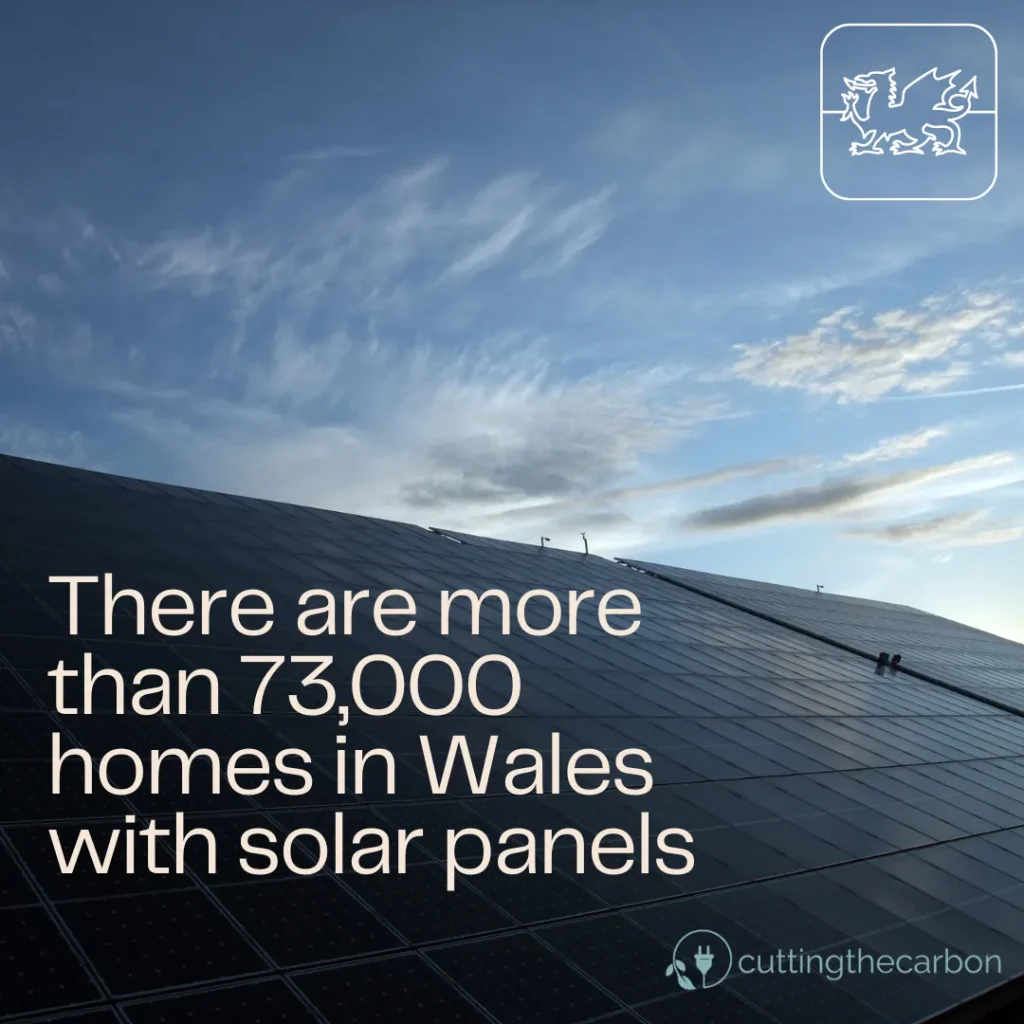Solar panel grants in Wales can be very beneficial for those seeking to harness the power of solar energy. With several initiatives and schemes available, homeowners across Wales have numerous opportunities to make their homes more energy-efficient while reducing their environmental impact.
The ECO4 scheme offers significant support towards installing solar panels, with specific qualifying criteria and an easy application process. Additionally, under this scheme is the LA Flex expansion which extends its benefits even further.
Apart from this, there’s Nest – a Welsh Government initiative specifically designed to assist residents in making their homes more energy efficient. We’ll delve into eligibility requirements and how you can apply for it.
We will also look at Smart Export Guarantee (SEG), a program that allows you to earn money by feeding excess electricity back into the national grid. Lastly, we will discuss VAT reductions on energy-saving materials, including new solar panel systems, which could lead to substantial savings on your investment.
By understanding these different facets of solar panel grants in Wales, one can make an informed decision about investing in a sustainable future through renewable sources like solar energy.

ECO4 Scheme for Solar Panels in Wales
The UK government’s Energy Company Obligation scheme, also known as the ECO4, is a grant that can help low-income households in Wales get solar panels. It’s like a sunny gift from the government.
Qualifying Criteria for ECO4 Scheme
To qualify for this generous grant, you must be a homeowner or private tenant and receive certain means-tested benefits. It’s like a solar-powered treasure hunt.
Application Process for the ECO4 Grant
If you meet the criteria, applying is simple. Contact your local council to begin the application process for the ECO4 Grant, and soon you’ll have a solar-powered personal assistant. It’s like having a solar-powered personal assistant.
LA Flex Expansion under the ECO4 Scheme
Some Local Authorities (LAs) have extra flexibility under the ECO4 scheme. They can define their own eligibility criteria, so more people could potentially benefit from solar panels. It’s like a solar-powered loophole.
ECO4 North Wales Energy Grants Free Solar Free Renewable Heating Video
Nest – A Welsh Government Initiative
The Welsh government introduced a program called Nest to make homes cosier and more energy efficient. It’s like a warm hug from your home. They even offer free advice on going green and can help with energy efficiency improvements if you qualify.
Eligibility Requirements for Nest Support
To get support from Nest, you need to:
- Own or privately rent your property.
- Earn less than £30,000 annually after tax and NI contributions to be eligible for Nest assistance.
- Live in an area without mains gas heating or have a health condition worsened by cold living conditions.
If you meet these criteria, you could get free help with installing solar panels. Call Nest’s helpline at 0808 808 2244 for free energy-saving advice.
Applying to the Nest Program
Applying to Nest is straightforward. Call their freephone number (0808 808 2244), and their friendly advisors will guide you through the process. They’ll arrange a visit from an assessor who will determine the best ways to improve your home’s energy efficiency. And don’t worry; accredited installers do all the work.
Not only can Nest help with solar panels, but other schemes like ECO4 and NEST can also give you advice on cutting carbon emissions and saving money on utility bills. It’s like having a personal energy-saving guru.
Here is a table summarising the grants available for Solar Panels in Wales:
| Grant | Description | Eligibility |
|---|---|---|
| ECO4 | The Welsh government’s Nest scheme offers free, impartial advice on making your home warmer and more energy efficient and, if you’re eligible, free energy efficiency improvements, including solar panels. | To qualify, you’ll need to meet specific criteria, including having a household income of less than £31,000 per year, being referred by your energy provider, local authority, or doctor, and receiving certain benefits. |
| Nest Scheme | The UK government introduced 0% VAT on energy-saving materials, including solar panels, in April 2022, which will last until 2027. | To qualify, you’ll need to meet specific criteria, including having a household income of less than £31,000 per year, being referred by your energy provider, local authority, or doctor, and receiving certain benefits. |
| Smart Export Guarantee (SEG) | The SEG is a form of solar funding that allows you to make a small amount of money from feeding your spare electricity back into the grid. | Licensed electricity suppliers (those with 150,000 customers or more) are required by law to offer an export tariff for people who choose to use the SEG. |
| VAT Reduction | The UK government introduced 0% VAT on energy-saving materials, including solar panels, in April 2022, and this will last until 2027. | This applies to all households in the UK, including Wales. |
Making Money with Solar Panels via Smart Export Guarantee (SEG)
Did you know that you can generate revenue from your solar panels through the UK government’s Smart Export Guarantee (SEG)? The UK government introduced the Smart Export Guarantee (SEG) to let you sell your surplus electricity back to the grid.
How Does SEG Work?
It’s simple: if your solar panels generate more electricity than you use, you can sell the excess power to an energy supplier. This reduces waste and puts money in your pocket.
To participate, you need a smart meter to measure how much electricity you export. Energy suppliers remunerate you for each kWh of power produced and exported.
The payment rates vary among suppliers, so research to find the best deal.
Best Rates Available Under SEG
Let’s check out some providers with competitive rates:
- Octopus Energy: They offer competitive export tariffs based on wholesale prices, with monthly payments directly to your bank account.
- Bulb Energy: Bulb pays all members who export extra electricity through their standard variable tariff, regardless of whether they buy power from them.
- SSE Airtricity: They have two options – Fixed Rate Tariff and Variable Rate Tariff, with payments made quarterly via cheque or credit against future bills.
So, not only can solar panels help the environment and save you money, but they can also make you some extra cash with the Smart Export Guarantee.

What Is The Cost Of Solar Panels In Wales Currently?
The cost of solar panels in Wales can vary depending on several factors, including the size of the system, installation costs, and whether you choose to add a solar battery. On average, a 3.5 kW solar panel system, suitable for a three-bedroom home, costs around £7,860, including installation.
It’s important to note that solar panel prices have been falling, making them more accessible to a larger number of people. 69% of people considered cost the most crucial factor when deciding which low-carbon product to purchase. Therefore, the decreasing cost of solar panels is a positive trend for those considering this renewable energy option.
Do solar panels work in Welsh weather conditions?
Contrary to popular belief, solar panels are quite efficient in Wales due to its higher-than-average sunshine hours compared to the rest of the UK. While the UK receives approximately 1,492 sunshine hours annually, Cardiff enjoys around 1,549 hours.
Coastal regions boast even more impressive figures. For instance, Cardigan, a well-known coastal town, experiences about 1,668 sunshine hours yearly, which is sufficient to power a solar panel system.
However, placing your solar panels is crucial for optimal efficiency, even on the sunniest days. South-facing solar panels are more effective than north-facing ones throughout the year, as they receive more sunlight.
You might also want to think about investing in a solar battery. This device allows you to store surplus electricity for later use. Although the initial cost of a solar battery is significant, around £4,500, it can significantly reduce your dependence on the grid.
It’s worth noting that despite the initial investment, solar batteries can help you avoid purchasing electricity from the grid. As of 2023, the cost of electricity in Wales ranges from 26-28 kWh (kilowatts per hour). Without a solar battery, you’ll still need to purchase electricity from the grid once the sun sets.
The Welsh Governments Future Renewable Energy Progress And Targets
| Key Point | Details |
|---|---|
| Target | The Welsh Government has set a target of meeting the equivalent of 70% of Wales’ electricity demand from Welsh renewable electricity sources by 2030. |
| Progress (2019) | Progress towards the 70% target has been a combination of decreasing electricity consumption (decreased by 16% since 2005) and increasing renewable electricity generation (increased by over 500% since 2005). |
| Historical Progress | Progress towards the 70% target has been a combination of both decreasing electricity consumption (decreased by 16% since 2005) and increasing renewable electricity generation (increased by over 500% since 2005). |
| Challenges | There are significant challenges to meeting the 70% target by 2030. These include securing price support for renewable generation and developing sustainable, subsidy-free business models. |
| Key Contributors | Increased renewable generation in 2019 was predominantly due to an increase in onshore wind generation following the commissioning of two large-scale projects. |
| Future Potential | There is potential for a similar step change in the 2020s if emerging market conditions, national policies, and offshore wind opportunities are realised. |

VAT Reduction on Energy-Saving Materials, Including Solar Panels
For UK homeowners, there is good news. The government is giving you a sweet deal to go green. They’ve introduced a 0% VAT rate on energy-saving materials, like solar panels, until 2027. That means significant savings when you buy a new solar panel system and a big thumbs up to lower energy bills.
Average Savings Due to VAT Reduction on New Solar Panel Systems
So, how much can you save? The cost of installing solar panels can vary, but with this 0% VAT policy, you’re in for some serious savings.
The average solar panel installation costs around £6,000 (including standard-rate VAT). By removing the tax entirely until 2027, you could potentially save up to £1,200. These numbers are just estimates, though. Your actual savings may vary.
VAT reduction can make solar panels more affordable, leading to greener households and a smaller carbon footprint. Thanks to the government’s VAT reduction, homeowners in the UK can now more easily switch to solar energy and benefit from reduced reliance on non-renewable resources while also helping protect our planet.
We encourage you to use our carbon footprint calculator app, which delivers an initial, uncomplicated, behaviour-based estimation of the yearly CO2 emissions.
By going solar, you’re saving money on your purchase and reducing your reliance on non-renewable resources and helping the environment. It’s a win-win situation for your wallet and our planet.
If you want to cut down on your monthly utility expenses and make the most of the space in your property, consider getting a brand-new solar panel system.
For the best solar panel systems, contact us at Cuttingthecarbon. We specialise in finding the right green technology solutions to help you save money on those pesky energy bills without sacrificing comfort and convenience in your everyday life.
UK homeowners can take advantage of a 0% VAT rate on energy-saving materials, such as solar panels, until 2027. This means potential savings of up to £1,200 on the installation cost and a greener home with reduced reliance on non-renewable resources. It’s an opportunity to save money and help the environment by switching to solar energy.
FAQs Concerning Solar Panel Grants Wales
Can you get grants for solar panels in Wales?
Yes, solar panel grants are available in Wales. The UK’s Smart Export Guarantee (SEG) pays households for the renewable electricity they export. Additionally, local Welsh schemes like the Home Energy Efficiency and Nest schemes offer financial aid for solar installations.
Is it worth getting solar panels in Wales?
Yes, getting solar panels in Wales can be worthwhile. Despite the country’s reputation for cloudy weather, solar panels can still generate significant power. The UK’s Smart Export Guarantee (SEG) can provide financial benefits by paying for exported renewable electricity.
Do solar panels work in winter?
Yes, solar panels do work in winter. They generate power from light, not heat, so they can still produce electricity on cold, sunny days. However, shorter days and snow coverage can reduce their output during winter months.
Solar Panel Grants In Wales Final Thoughts
If you’re looking to go solar in Wales, You have options.
The ECO4 Scheme offers cash for eligible households, with an easy application process and the potential for LA Flex Expansion.
The Nest program, a Welsh Government initiative, helps you meet your energy efficiency needs. Plus, you can make some money by joining the Smart Export Guarantee (SEG) scheme and enjoy reduced VAT on energy-saving materials like solar panels.

